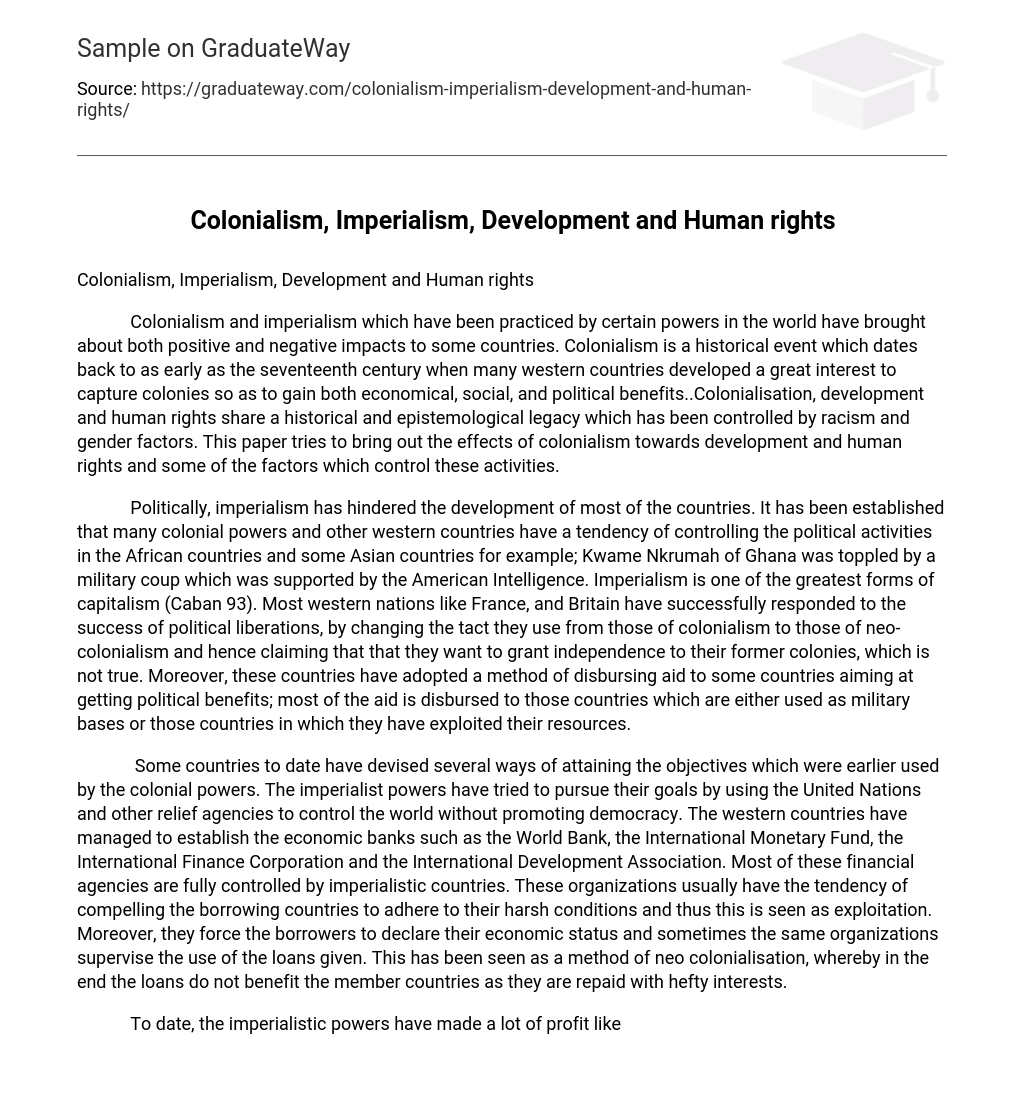Colonialism and imperialism which have been practiced by certain powers in the world have brought about both positive and negative impacts to some countries. Colonialism is a historical event which dates back to as early as the seventeenth century when many western countries developed a great interest to capture colonies so as to gain both economical, social, and political benefits..Colonialisation, development and human rights share a historical and epistemological legacy which has been controlled by racism and gender factors. This paper tries to bring out the effects of colonialism towards development and human rights and some of the factors which control these activities.
Politically, imperialism has hindered the development of most of the countries. It has been established that many colonial powers and other western countries have a tendency of controlling the political activities in the African countries and some Asian countries for example; Kwame Nkrumah of Ghana was toppled by a military coup which was supported by the American Intelligence. Imperialism is one of the greatest forms of capitalism (Caban 93). Most western nations like France, and Britain have successfully responded to the success of political liberations, by changing the tact they use from those of colonialism to those of neo-colonialism and hence claiming that that they want to grant independence to their former colonies, which is not true. Moreover, these countries have adopted a method of disbursing aid to some countries aiming at getting political benefits; most of the aid is disbursed to those countries which are either used as military bases or those countries in which they have exploited their resources.
Some countries to date have devised several ways of attaining the objectives which were earlier used by the colonial powers. The imperialist powers have tried to pursue their goals by using the United Nations and other relief agencies to control the world without promoting democracy. The western countries have managed to establish the economic banks such as the World Bank, the International Monetary Fund, the International Finance Corporation and the International Development Association. Most of these financial agencies are fully controlled by imperialistic countries. These organizations usually have the tendency of compelling the borrowing countries to adhere to their harsh conditions and thus this is seen as exploitation. Moreover, they force the borrowers to declare their economic status and sometimes the same organizations supervise the use of the loans given. This has been seen as a method of neo colonialisation, whereby in the end the loans do not benefit the member countries as they are repaid with hefty interests.
To date, the imperialistic powers have made a lot of profit like the colonialists did. The Western powers control most of the commodity prices; they usually lower the prices of the commodities which have more importance to their territories. Consequently, they have established navigation treaties, foreign exchange treaties and economic co-operation which lower most of the trade barriers aimed at benefiting the donor world in general. Moreover, they protect the interests of private sectors and determine the ways in which the funds are managed. This has led to the supply of raw materials to the donor world in exchange of the funds provided or sometimes the same funds are used to buy goods from the donor countries thus benefiting them in turn. Harsh conditions are mostly employed in the industrial, agricultural and commercial sectors. In addition, the military trade has the greatest destination in Africa, Asia, and Latin America continents which is aimed at profiting the imperialistic world (Cooper and Stoler 201-202)
The colonial aspect not only affects the economic field, but it also affects the religious, political and cultural issues.Neo colonial organization has consequently manipulated the labor agencies in the world to fit in their agendas. Religion has been manipulated in different ways to support the growth of imperialism in the world, many religious sects have been established by the western world, majority of which have their origin from the American continent such as the Jehovah witness who forcefully want to convert some individuals in the African continent. Moreover, most Peace Corps and other voluntary organizations are in the front line of supporting neo colonialism (Harris 309).
Colonialism has many consequences upon the human rights, since the world is being controlled by some powers; citizens have been exploited socially, politically, and economically. The local nationals have lost their lives due to the prevailing poverty situation created by the colonial powers. Resources such as minerals and land have been exploited leaving most of the countries in a poor state. People have lost their religious rights since they have opted to copy the western culture and religion. The racial factor has been linked with imperialism; a lot of colonialisation has been practiced in the countries of the African and Asian continents. Most of the imperial powers have proceeded to exploit the African and Asian countries due to their poverty status. Military bases are established mostly in Africa and Asia (Wilson 55-60)
In conclusion, colonialism and Imperialism have brought about negative impact in the development and promotion of human rights. Imperialism has a historical legacy and is one of the vices in the world which can be easily controlled. To the larger extent, the racial factor has perpetrated and promoted imperialism.
Work cited
Caban, Pedro A. Constructing Colonial People: Puerto Rico and the United States, 1898-1932. Boulder, CO: West view Press.1999.
Cooper, Frederick and Stoler, Ann L. (Eds.). pp 201-230. Tensions of Empire: Colonial Cultures in a Bourgeois World. Berkeley, CA: University of California Press.1997.
Harris, Paul W. Cultural Imperialism and American Protestant Missionaries: Collaboration and Dependency in Mid-Nineteenth-Century China. Pacific Historical Review. v60n3, August 1991.
Wilson, Kathleen. The Sense of the People: Politics, Culture, and Imperialism In England, 1715-1785. Cambridge; New York: Cambridge University Press.1995.





